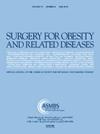与减肥复诊出席率和体重结果相关的社会人口因素
IF 3.5
3区 医学
Q1 SURGERY
引用次数: 0
摘要
减肥手术后的后续护理对于预防手术后并发症和促进长期减肥效果的维持至关重要。然而,许多患者在手术后并没有与减肥团队预约随访,这可能会导致手术效果不佳。本研究旨在了解与复诊出席率和体重结果相关的社会人口学因素。第一个目标是确定一年随访预约出席率与社会人口学因素之间是否存在关系。第二个目标是确定某些社会人口学群体的患者是否更有可能参加为期 2 年的复诊。第三个目标是确定参加随访的患者与未参加随访的患者在体重结果上是否存在差异。美国大学医院。该研究是一项回顾性观察研究。参与者包括 841 名接受减肥手术的成年患者,其中 505 人(60.05%)接受了减肥团队为期 1 年的随访(348 人接受了其他医疗机构的随访),398 人(47.32%)在术后 2 年接受了任何随访。社会人口学变量是在术前心理评估中收集的。与体重相关的变量通过患者术后 12 个月和 24 个月的电子病历获得。较年轻的患者和教育程度较低的患者较少参加减肥小组的 1 年随访。参加减肥小组 1 年随访的患者在术后 1 年和 2 年的体重结果更理想。参加减肥团队的随访可能是减肥手术效果的关键因素。减肥手术团队应采取策略,提高手术团队 1 年随访的出席率。还应制定其他策略,提高教育程度较低患者的随访出席率。本文章由计算机程序翻译,如有差异,请以英文原文为准。
Sociodemographic factors related to bariatric follow-up appointment attendance and weight outcomes
Background
Follow-up care after bariatric surgery is essential in preventing postsurgical complications and promoting long-term weight loss maintenance. However, many patients do not attend postsurgical appointments with the bariatric team, which may contribute to poor surgical outcomes.
Objectives
This study sought to understand sociodemographic factors related to follow-up appointment attendance and weight outcomes. The first objective was to determine whether there was a relationship between 1-year follow-up appointment attendance and sociodemographic factors. The second objective was to determine whether patients from certain sociodemographic groups were more likely to attend a 2-year follow-up appointment. The third objective was to determine whether there were differences in weight outcomes for patients who attended follow-up appointments compared with those who did not attend.
Setting
University hospital, United States.
Methods
This study was a retrospective observational study. Participants included 841 adult patients who underwent bariatric surgery, of whom 505 (60.05%) attended a 1-year appointment with the bariatric team (348 attended a follow-up visit with another medical provider), and 398 (47.32%) who had any follow-up medical visit at 2 years after surgery. Sociodemographic variables were collected during a presurgical psychological evaluation. Weight-related variables were obtained through patients’ electronic medical records 12 and 24 months after surgery.
Results
Younger patients and those with lower education levels were less likely to attend the 1-year follow-up appointment with the bariatric team. People who attend 1-year follow-up with bariatric team have more favorable weight outcomes at 1 year and 2 years after surgery.
Conclusions
Follow-up appointment attendance with the bariatric team may be a critical factor in the effectiveness of bariatric surgery. Bariatric surgery teams should employ strategies to increase attendance at the 1-year follow-up visit with the surgical team. Additional strategies should be enacted to increase follow-up appointment attendance for patients with lower education levels.
求助全文
通过发布文献求助,成功后即可免费获取论文全文。
去求助
来源期刊
CiteScore
6.70
自引率
12.90%
发文量
570
审稿时长
56 days
期刊介绍:
Surgery for Obesity and Related Diseases (SOARD), The Official Journal of the American Society for Metabolic and Bariatric Surgery (ASMBS) and the Brazilian Society for Bariatric Surgery, is an international journal devoted to the publication of peer-reviewed manuscripts of the highest quality with objective data regarding techniques for the treatment of severe obesity. Articles document the effects of surgically induced weight loss on obesity physiological, psychiatric and social co-morbidities.

 求助内容:
求助内容: 应助结果提醒方式:
应助结果提醒方式:


